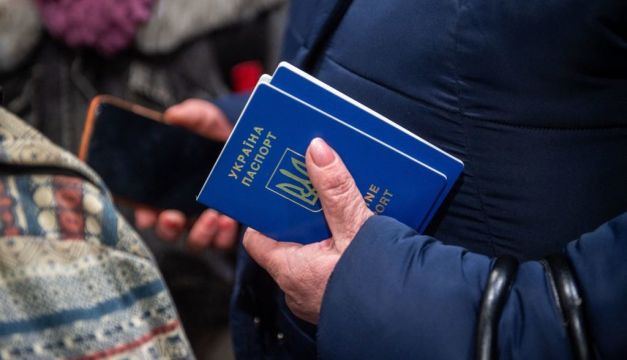Questions remain over how the State is going to achieve stability and security of accommodation for Ukrainian refugees, a representative group has said.
Doras, which has worked with asylum seekers, refugees and migrants for over 20 years, welcomed the Government’s plan to shift from an emergency response for refugees coming from Ukraine in favour of a “more mainstreamed approach”.
On Friday, the Government confirmed it would be doubling the recognition payment for households hosting Ukrainian refugees to €800, in addition to a €50 million community fund.
Doras’ chief executive John Lannon said while some aspects of the Government’s renewed plans are positive, “other aspects of it are somewhat worrying”.
“We don’t yet see where the stability and security of accommodation for people from Ukraine, and also for international protection applicants, is going to come from.
“There are a number of pieces that need to come together – pledged accommodation, refurbished buildings, the rapid-build modular homes – these are all going to help, but as we look to the future, there appears to still be an over-reliance on hotels.”
Mr Lannon insists the State can do better, stressing the need for better coordination between local and national efforts, and more of an emphasis on mid-to-long term planning.
“It can’t happen overnight, but we do need to ensure that we start moving on these longer-term elements as quickly as possible.”
People have already been traumatised by war and displacement
Friday’s ‘incorporeal meeting’ of the Cabinet to discuss the emergency accommodation crisis followed warnings the State cannot guarantee accommodation for those coming to Ireland as reception centres have reached capacity.
While senior Government figures has reiterated there is no plan to cap the number of refugees which will be permitted to come to Ireland from Ukraine, Mr Lannon has warned there are refugees and international protection applicants “living in situations where standards are quite poor”.
“People have already been traumatised by war and displacement. They come here seeking some degree of stability and security, and living in temporary or emergency accommodation is extremely difficult, particularly for children.
“Access to services and supports, and mental health services is really challenging across the country. Great work is being down at community, but it’s being done on a shoestring.
“Resources are already stretched and that makes it difficult to provide the necessary supports for Ukrainians, and also the communities in which they are being hosted.”
While the priority must be to ensure that those arriving in Ireland seeking protection are treated in a manner that keeps them safe and secure, Mr Lannon feels there is also a need for “equity of treatment” for international protection applicants from elsewhere.
Since the outbreak of the war back in February, Ireland has granted Ukrainians temporary protection status, allowing them to work and receive social welfare, healthcare, education and training.
Meanwhile, international protection applicants from other countries are not afforded the same permissions, and often face lengthy delays which block their access to work and social welfare allowances, such as child benefit.
Mr Lannon believes that in order to provide this equity of treatment for all people seeking refuge in Ireland, the weekly expenses allowance for international protection applicants should be increased, as well as giving them access to child benefit and allowing them to work from when they arrive here.
Direct provision
While Mr Lannon acknowledges that the Department of Integration has done a “phenomenal job in providing the number of beds that it did”, he adds the spike in refugees has seen even more people entering the Direct Provision system at a time when it was due to be winding down.
In March 2021, the Government published a White Paper detailing its plans to end Direct Provision by the end of 2024, however, Mr Lannon says: “We don’t have sight now on when or how the ending of Direct Provision will occur.

“We have been told by the Minister [Roderic O’Gorman] that commitment to end it by the end of 2024 is not realistic and that isn’t surprising, given the influx of so many people from Ukraine, but we do need to see a timeline for it.”
Despite the challenges facing emergency accommodation, he says communities around the country have been “fantastic”, adding “Irish people continue to be very welcoming and supportive of Ukrainians”.
“The level of stress that the State was under to provide accommodation has potentially caused the narrative to shift a little, but we have a responsibility collectively to ensure that we continue to welcome people.
“Continuing to support people, showing welcome for them and ensuring that communities come together in a positive, constructive way to ensure that refugees are always made welcome, whether they come from Ukraine or any other part of the world, is hugely important for us here in Ireland – to make sure that welcome and goodwill towards refugees continues at all times.”







